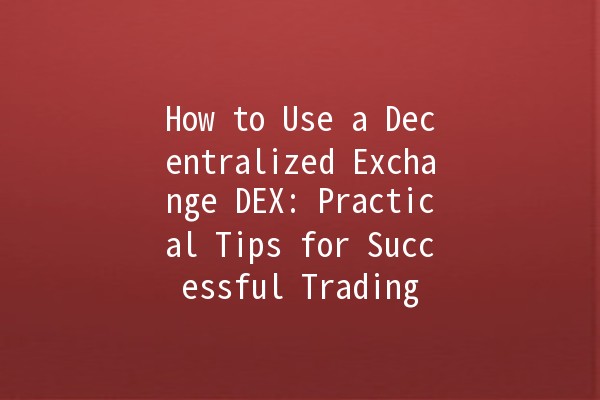
Decentralized exchanges (DEXs) have revolutionized the way we trade cryptocurrencies. Unlike traditional exchanges, DEXs allow direct peertopeer transactions without intermediaries, thus offering users more control over their funds. However, navigating the world of DEXs can be challenging for newcomers. This article is tailored to provide practical tips to enhance your experience and effectiveness while using a DEX.
Understanding Decentralized Exchanges
Before diving into practical tips, it's vital to understand what a decentralized exchange is. At its core, a DEX facilitates cryptocurrency trading through smart contracts. Users retain control of their private keys, enhancing security. Popular DEXs like Uniswap, SushiSwap, and PancakeSwap operate on various blockchain networks, each with unique features.
Benefits of Using a DEX

While these benefits are enticing, it’s equally crucial to navigate DEXs effectively to maximize your trading efficiency.
Practical Tips for Using Decentralized Exchanges
Selecting a compatible cryptocurrency wallet is the first step to accessing a DEX. Software wallets, such as MetaMask and Trust Wallet, are popular choices due to their userfriendly interfaces and compatibility with multiple DEXs.
Example: If you plan to trade on Uniswap, setting up a MetaMask wallet will allow you to connect seamlessly. Download the extension or app, create an account, and fund it with Ethereum to start trading.
Liquidity pools allow users to provide their cryptocurrencies to facilitate trading on a DEX, earning fees in return. However, when trading, slippage—the difference between the expected price and the actual price at which the trade executes—can significantly affect your results.
How to Minimize Slippage:
Set slippage tolerance in the DEX interface, typically between 0.5% to 1%.
Avoid extremely large orders relative to the pool’s size to maintain a better price execution.
Example: If you want to swap Ethereum for a lessknown token (Token A), setting a reasonable slippage tolerance ensures your trade processes smoothly without unexpected costs.
Before trading any token, conducting due diligence is essential. Research the project, its team, and community feedback. Look for indicators of legitimacy, such as the presence of an active development team on GitHub or a vibrant community on forums like Reddit or Discord.
Tips for Research:
Check liquidity: Is there enough liquidity for the token you want to trade?
Review tokenomics: Understand the distribution, token supply, and purpose of the token.
Many DEXs now offer limit order features akin to those found in traditional exchanges. This allows you to set specific price points for buying or selling tokens.
How to Use Limit Orders:
Navigate to the trading interface and select the limit order option.
Specify the price and amount of tokens you wish to buy or sell.
Example: If you want to buy Token B currently trading at $10, but believe it may dip to $8 soon, set a limit order at $
Gas fees, which are transaction fees paid to miners, can fluctuate wildly based on network congestion. Monitoring these fees can help you choose the right time to trade.
Tips to Optimize Gas Fees:
Use a gas tracker like EthGasStation to monitor current rates.
Trade during offpeak hours when gas fees tend to be lower.
Example: If Ethereum’s network is congested, leading to gas prices above $50, consider waiting until latenight hours when fees drop to $10 or less.
Frequently Asked Questions
DECs are not without risks. Users face potential hacks, smart contract bugs, and market volatility. It's crucial to only trade from trusted platforms and keep your wallet secure.
To swap tokens, connect your wallet to the DEX, select the tokens you wish to trade, specify the amounts, and confirm the transaction. Ensure you understand slippage settings to avoid unexpected costs.
No, a wallet is necessary to interact with a DEX. Wallets enable you to hold your private keys, manage your assets, and sign transactions without a central authority.
Impermanent loss occurs when the price of assets in a liquidity pool changes compared to when they were deposited. As a liquidity provider, this can result in less value than if you had simply held those assets.
Research is critical. Look for projects with strong community support, transparent teams, active development, and a clear utility for their tokens. Sites like CoinGecko can help assess various DEXs’ popularity and liquidity.
While DEXs can seem complicated, they offer benefits to beginners. With the right research and wallet setup, beginners can trade with increased control and fewer barriers than centralized exchanges.
By implementing these practical tips and understanding the intricacies of decentralized exchanges, you'll be equipped to navigate this exciting aspect of the crypto space effectively. Remember to maintain a cautious approach, always do your research, and enjoy the trading experience!

